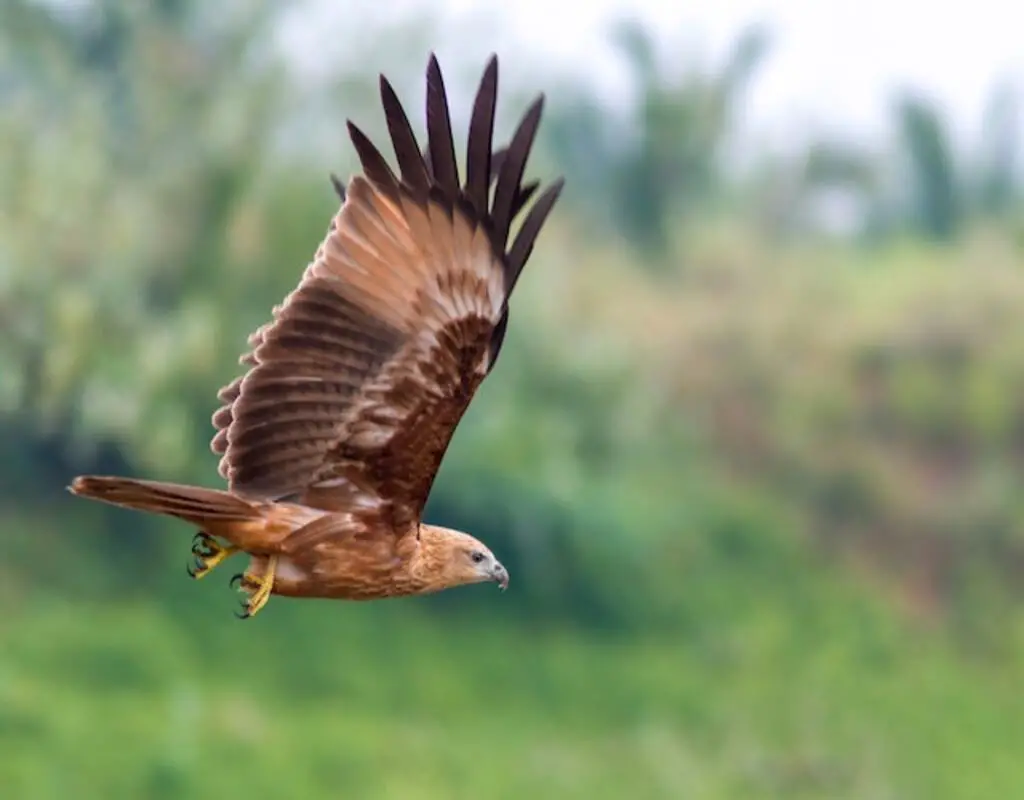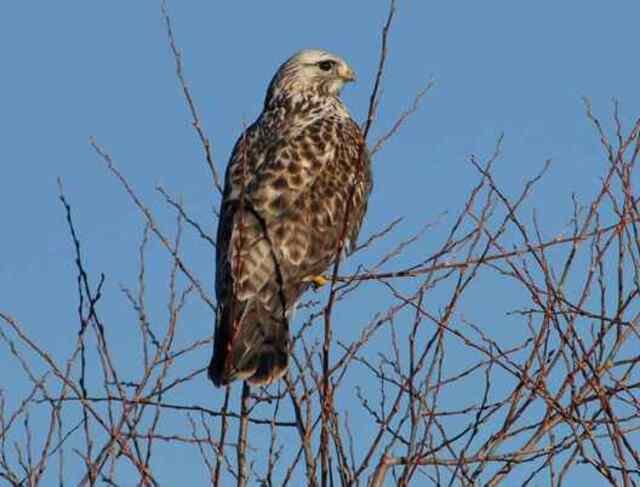Calling all nature enthusiasts and curious minds! Have you ever wondered if hawks, those awe-inspiring hunters of the sky, secretly moonlight as the garbage collectors of the avian world?
Well, prepare to have your perception turned upside down as we delve into the fascinating question: Are Hawks Scavengers?
Short answer: No, they are not. But hold on! Before you assume they’re just clean-cut carnivores, we’re about to embark on an adventure that uncovers the intriguing secrets of these feathered detectives.
Get ready to explore their hidden scavenging tendencies, debunk myths, and uncover the surprises that lie beneath their soaring wings.
So, fasten your seatbelts, put on your detective hats, and let’s uncover the truth about hawks and their remarkable dining habits!
Table of Contents
- 1 Are Hawks Scavengers?
- 2 Overview of Hawks’ Hunting Abilities
- 3 Definition of Scavenging
- 4 Evidence for Hawks Scavenging
- 5 Arguments Against Hawks Scavenging
- 6 The Role of Hawks in the Ecosystem
- 7 Other Birds of Prey that Scavenge
- 8 Importance of Accurate Information
- 9 Frequently Asked Questions
- 10 Conclusion
- 11 Author
Are Hawks Scavengers?
No, hawks are not primarily scavengers. They are birds of prey known for their exceptional hunting skills. Hawks are carnivorous and typically hunt live prey such as small mammals, birds, reptiles, and insects.
While they may opportunistically scavenge on occasion, their diet mainly consists of fresh kills obtained through active hunting and capturing techniques.
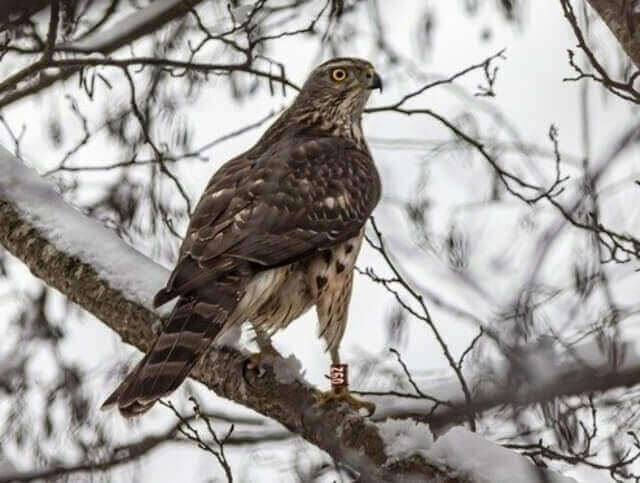
Overview of Hawks’ Hunting Abilities
You’re about to learn just how skilled these birds of prey are when it comes to hunting down their prey. Comparing hawks and eagles, hawks are known for their speed and agility in the air.
They can fly up to 120 miles per hour and have sharp talons and beaks that are designed to catch and kill their prey.
Hawks are skilled hunters and have a variety of hunting techniques. Some hawks, like the Cooper’s hawk, are ambush predators that will hide in trees and surprise their prey.
Others, like the red-tailed hawk, will soar high in the sky and dive to catch their prey.
Hawks have different prey preferences depending on their size and habitat.
Smaller hawks, like the American kestrel, will hunt insects and small rodents, while larger hawks, like the ferruginous hawk, will hunt bigger prey like rabbits and ground squirrels.
Now, let’s dive into the definition of scavenging.
Definition of Scavenging
Scavenging is like being a vulture, picking at the remains of a feast, searching for any bits and pieces left behind.
It is the act of feeding on dead animals or their remains, and it is often associated with animals that cannot hunt for their own food.
However, this definition is a misconception. Scavenging is a natural and important behavior for many animals, including hawks. It is a way for them to find food and survive in times when hunting is difficult.
To understand the importance of scavenging for hawks, consider the following sub-lists:
- Hawks are predators, but they are not always successful in their hunts. Scavenging allows them to find food when their prey is scarce or when they are injured and unable to hunt.
- Scavenging is a way for hawks to diversify their diet. They may feed on a variety of animals, including those that they wouldn’t typically hunt.
-Scavenging is a way for hawks to save energy. Hunting requires a lot of energy, and scavenging allows them to conserve it for when they really need it.
Despite the importance of scavenging for hawks, there are misconceptions that they aren’t capable of it. However, evidence suggests otherwise. In the subsequent section, we’ll explore the evidence for hawks scavenging.
Evidence for Hawks Scavenging
There’s evidence to suggest that scavenging is a natural and important behavior for many predators, including hawks. Hawks have been observed scavenging on carrion, often alongside other scavengers such as vultures and eagles.
While hawks are primarily considered hunters, their scavenging behavior provides potential benefits such as a reliable food source and reduced energy expenditure.
However, scavenging can also impact competition for resources with other scavengers.
Despite this, hawks’ scavenging behavior is an important aspect of their ecological role and should be considered in conservation efforts.
Moving forward, it’s important to understand the balance between hunting and scavenging for hawks and other predators.
In the following section, we’ll explore arguments against hawks scavenging.
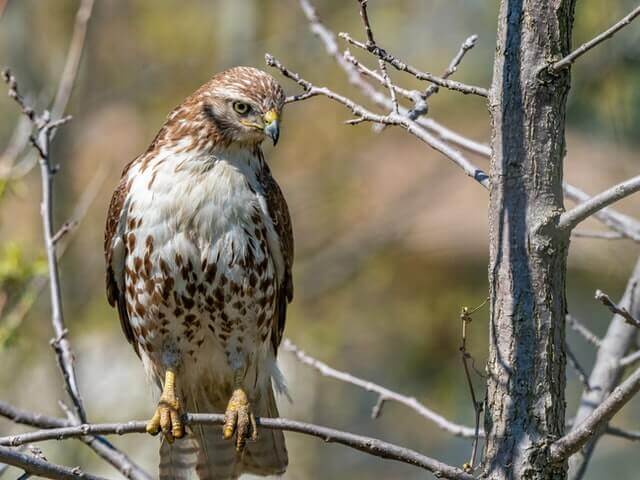
Arguments Against Hawks Scavenging
When considering the argument against hawks scavenging, it’s important to acknowledge their inherent hunting instincts.
Hawks are skilled hunters, with sharp talons and keen eyesight, which makes scavenging less necessary for their survival.
Additionally, hawks have physical limitations that make scavenging more difficult, such as their inability to tear through tough hides and bones.
Overall, while there may be instances where hawks scavenge for food, their natural instincts and physical limitations suggest that scavenging is not a primary method of obtaining sustenance for these birds of prey.
Hunting Instincts
With their keen eyesight and lightning-fast reflexes, hunting is an instinct deeply embedded in these majestic birds of prey.
Hawks have developed various hunting techniques to capture their prey efficiently, such as dive-bombing, aerial pursuit, and ambush.
Their prey selection is also carefully chosen based on factors such as size, behavior, and availability.
Environmental factors also play a significant role in their hunting success, leading to adaptations like different hunting strategies or changes in their diet.
However, despite their impressive hunting abilities, hawks aren’t immune to physical limitations, which can affect their ability to hunt and survive in the wild.
Physical Limitations
Now that you understand hawks’ hunting instincts, it’s time to delve into their physical limitations and adaptations for hunting.
Hawks are formidable predators, but they’re not without limitations. For example, their eyesight is excellent, but they have a narrow field of vision.
Additionally, they’re not as fast as some other birds of prey, such as falcons.
To compensate, hawks have developed various adaptations for hunting, such as sharp talons, powerful wings, and keen hearing.
These adaptations make them highly effective hunters, even in challenging environments.
Overall, hawks’ physical limitations and adaptations for hunting are fascinating topics that shed light on their unique abilities and strategies in the wild.
With that said, let’s explore the role of hawks in the ecosystem.
The Role of Hawks in the Ecosystem
When it comes to the role of hawks in the ecosystem, it’s important to understand their impact on maintaining predator-prey balance and local food webs.
As a predator, hawks have a crucial role in regulating populations of their prey, which helps to prevent overgrazing and maintain a healthy ecosystem.
Their presence also affects the abundance and distribution of other species in the food web, making them a key player in the overall balance of the ecosystem.
Maintaining Predator-Prey Balance
Maintaining a delicate balance between predator and prey is crucial for the survival of many species in an ecosystem.
Predator-prey dynamics play a significant role in ecological balance, and hawks are essential predators in maintaining this balance.
Hawks hunt small mammals, birds, and reptiles, helping to control their populations. This, in turn, prevents overgrazing or overpopulation of prey species, which can have adverse effects on the ecosystem.
Hawks also help to remove sick or weak animals from the population, preventing the spread of disease.
By controlling the population of prey, hawks indirectly help to maintain a healthy environment for all other species.
As you learn about the significance of predators like hawks in ecological balance, you may wonder about their impact on local food webs.
Impact on Local Food Webs
The delicate balance of a food web is like a game of Jenga, where the removal of even one species can cause the entire system to collapse.
Hawks play a crucial role as top predators in many ecosystems, helping to regulate the population of their prey and maintain ecological balance.
However, the impact of hawks on local food webs goes beyond just hunting. They also serve as scavengers, cleaning up carrion and preventing the spread of disease.
This interconnectedness between hawks and other species highlights the importance of every organism in the food web and the fragile nature of the ecosystem.
Understanding the role of hawks as both predators and scavengers is crucial for conservation efforts and maintaining the balance of the food web.
Other birds of prey that scavenge, such as vultures, play similarly important roles in the ecosystem.
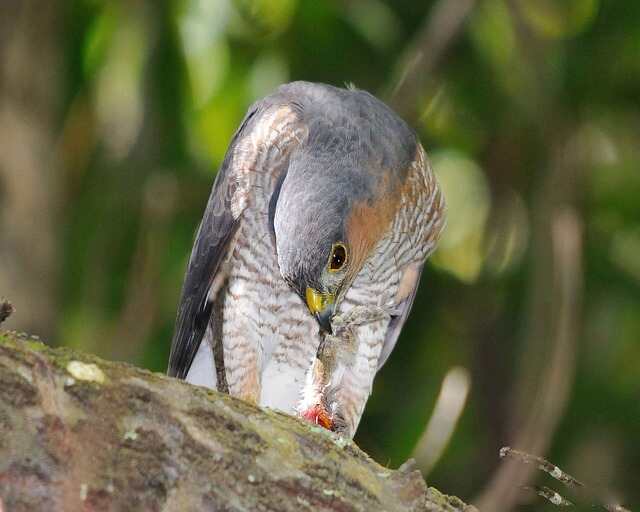
Other Birds of Prey that Scavenge
Birds like eagles and owls sometimes seek out meals by scavenging. While hawks are primarily known for their hunting abilities, there are some species that have been observed scavenging.
However, vultures and eagles are more well-known for their scavenging behavior, as they have specialized adaptations for it.
Unlike hawks, vultures have a sense of smell that allows them to locate carrion from a distance. Eagles, on the other hand, have powerful beaks and talons that allow them to tear apart tough carcasses.
In urban areas, hawks have also been observed scavenging on the remains of pigeons and other small animals. However, this behavior is not as common as their hunting behavior.
Overall, while hawks may scavenge on occasion, it is not their primary means of obtaining food.
It is important to have accurate information about the feeding habits of different bird species in order to better understand their role in the ecosystem and to make informed conservation decisions.
Importance of Accurate Information
When discussing the importance of accurate information, it’s crucial to understand the impact it has on conservation efforts. Accurate information can help guide conservation efforts towards the areas and species that need it most.
Additionally, it can influence public perception, leading to more support and funding for conservation initiatives.
Impact on Conservation Efforts
Conservation efforts can be significantly influenced by the role that different bird species play in their ecosystems, as demonstrated by the fact that over 40% of all bird populations are in decline.
With this in mind, it’s important to understand the true nature of birds, including hawks. While some people may believe that hawks are scavengers, the reality is that they’re not.
This misinformation can have an impact on conservation efforts, as it may lead to incorrect assumptions about the role hawks play in their ecosystem.
By understanding the true nature of hawks, conservationists can better protect these birds and their habitats, leading to a healthier ecosystem overall.
Additionally, this knowledge can help to dispel myths and misconceptions about birds, which can influence public perception and lead to more effective conservation efforts in the future.
Influence on Public Perception
Did you know that your perception of birds, including hawks, can greatly impact conservation efforts and the health of their ecosystems?
Public perception plays a crucial role in determining the success of conservation efforts, and misconceptions about hawks as scavengers can lead to negative attitudes towards these birds of prey.
This can result in a decreased willingness to protect them and their habitats, ultimately leading to a decline in their populations.
It’s important to educate the public on the true nature of hawks as predators that play a vital role in balancing their ecosystems.
By changing the way people view these majestic birds, we can ensure their survival and the health of the environment they inhabit.
With this in mind, it’s crucial to spread awareness about the importance of hawks and their role in our world.
Frequently Asked Questions
What is the average lifespan of a hawk?
Did you know that the average lifespan of a hawk can vary greatly depending on a number of factors? These factors include the species of hawk, the region in which it lives, and even the presence of predators.
For example, some species of hawks can live up to 20 years in the wild, while others may only live for a few years.
Additionally, hawks living in colder regions tend to have shorter lifespans than those living in warmer climates.
Despite these differences, one thing is certain: hawks are incredibly resilient creatures that have adapted to survive in a wide range of environments.
So if you’re looking to learn more about the fascinating world of hawks, there’s no better time to start exploring their incredible lifespan and the many factors that influence it.
How do hawks communicate with each other?
Do you ever wonder how hawks communicate with each other?
Body language and vocalizations are key ways that hawks convey messages to their flockmates. When hawks are perched, they use their body language to signal their intentions to other birds.
For example, a hawk might spread its wings and move its head in a specific way to signal that it’s ready to hunt.
Hawks also use vocalizations to communicate, such as screeches, screams, and calls. These sounds can convey a range of messages, from territorial warnings to mating calls.
While hawks may not be scavengers, their complex communication methods are fascinating to observe and study.
What is the hunting success rate of hawks compared to other birds of prey?
When it comes to hunting success rates, hawks are among the most skilled birds of prey.
Their hunting techniques are varied and adaptable, with different species relying on different methods to catch their prey.
Some hawks, like the red-tailed hawk, prefer to hunt from a stationary perch and swoop down on their prey with incredible speed and accuracy.
Other species, like the Cooper’s hawk, are known for their agility and ability to maneuver through dense forests in pursuit of prey.
In terms of prey preferences, hawks are opportunistic hunters and will go after a wide variety of animals, from small rodents and insects to larger birds and mammals.
Overall, hawks have a high hunting success rate compared to other birds of prey, thanks to their acute vision, powerful talons, and swift flight.
What is the average size of prey that hawks hunt?
So, you think you know everything about hawks and their prey? Well, let me tell you, there’s more than meets the eye.
Hawks are not just some lazy scavengers waiting for their prey to come to them. No, no, no, my friend. They’re skilled hunters, with a diverse range of species that have unique hunting strategies.
When it comes to the average size of their prey, it really depends on the specific hawk species and the behavior of their prey.
Some hawks, like the Cooper’s Hawk, prefer smaller prey like songbirds, while others, like the Red-tailed Hawk, can take down larger prey like rabbits or squirrels.
And let’s not forget about the behavior of the prey. A hawk may be able to hunt a larger animal, but if that animal is too fast or too agile, the hawk may have to settle for smaller prey.
So, when it comes to the average size of prey that hawks hunt, there really is no one size fits all answer. It all depends on the specific hawk species and the behavior of their prey.
How do hawks adapt to changes in their environment and food sources?
If you’re curious about how hawks adapt to changes in their environment and food sources, it’s important to understand their adaptation strategies and feeding behavior.
Hawks are known for their exceptional hunting skills, but they also have the ability to adapt to changing circumstances.
For example, during times of food scarcity, hawks may resort to scavenging or hunting smaller prey. They may also change their hunting technique or migrate to a new location in search of food.
These adaptations allow hawks to survive and thrive in a variety of environments.
Regardless of their feeding behavior, hawks remain powerful and majestic creatures that embody the freedom and independence that we all desire.
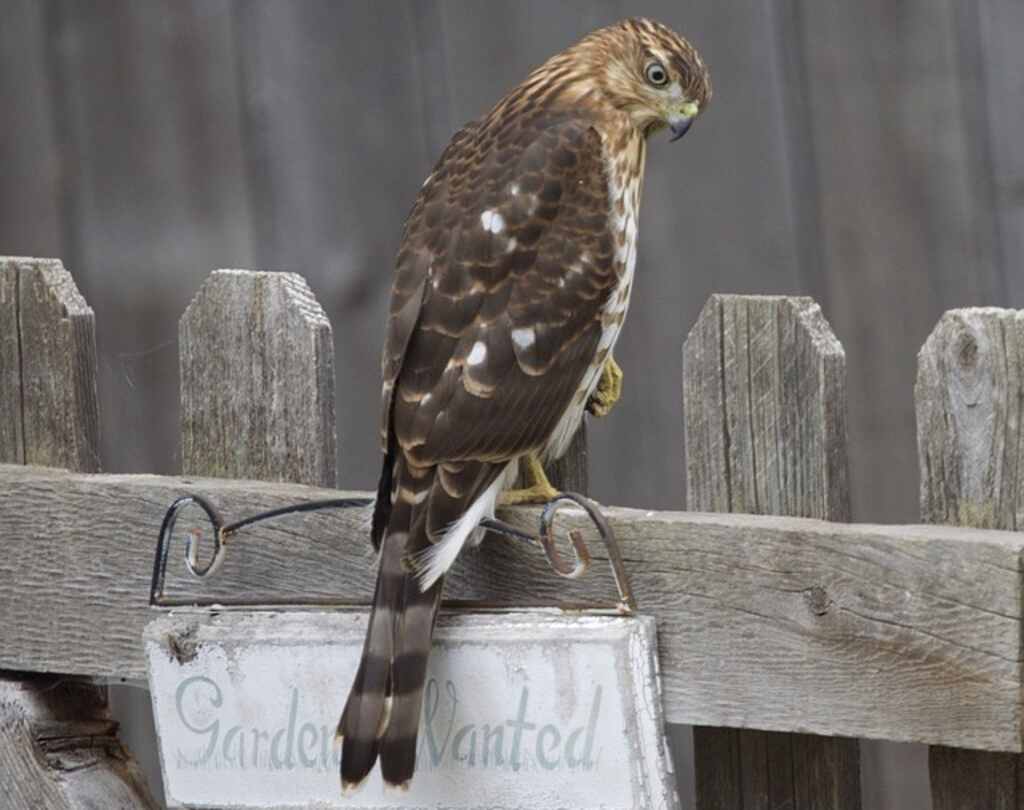
Conclusion
As you ponder over whether hawks are scavengers or not, one thing is clear – these birds of prey are essential to their ecosystem.
They play a crucial role in balancing the food chain by hunting small mammals and birds, keeping their populations in check.
However, the debate over hawks scavenging remains a contentious issue. While some evidence suggests that hawks do scavenge, it’s essential to understand the context in which they do so.
It shouldn’t detract from their primary hunting abilities, nor should it imply that they are dependent on carrion.
It’s crucial to have accurate information about these magnificent birds and their habits to appreciate their role in nature fully.
As we delve deeper into the mysteries of the natural world, we must remember that every creature has a unique place and purpose in the grand scheme of things. And hawks are no exception.

